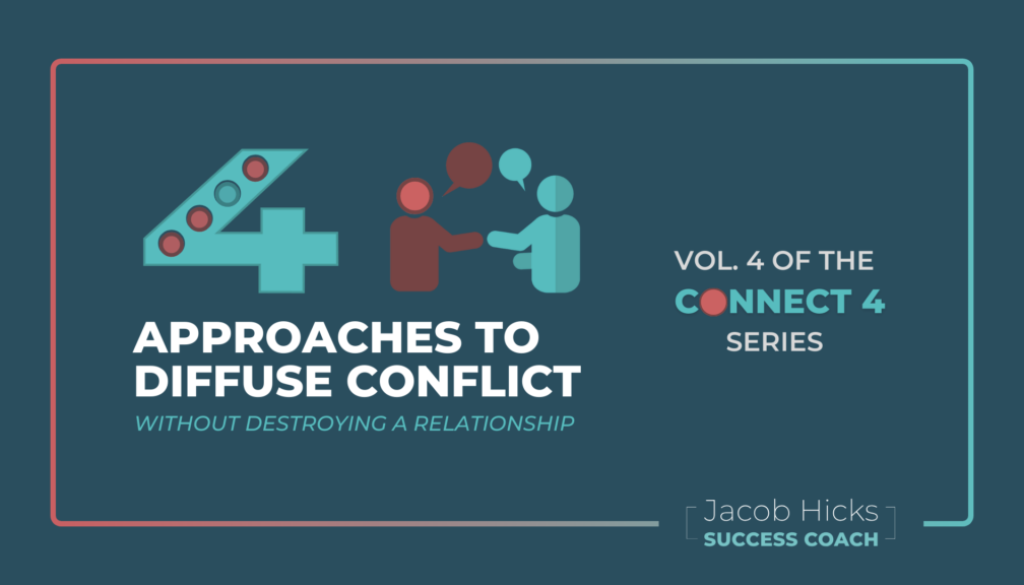4 APPROACHES TO DIFFUSE CONFLICT WITHOUT DESTROYING A RELATIONSHIP
Conflict or friction is inevitable in any relationship. Eventually, you will find something you disagree with someone on. And that’s OK! Conflict can (emphasis on “can”) be a way in which you grow together, develop new ideas, challenge each other, and ultimately develop deeper relationship where you know at the end of the day, this ends with you together.
1. PRACTICE ACTIVE LISTENING
If you saw my post earlier this month, you know that we covered this topic in great detail. If you didn’t, here it is! I would encourage you to check it. All I will say here is through silence, reflecting back, and the questions we ask among other skills, we can not only show the other person we understood what they said but also avoid misunderstandings before they start
Strategy: Employing the techniques I discuss to actively listen is generally important, but even more so during conflict. I’ll emphasize the “reflect back” technique here. Say, “What I’m hearing is…” to show them you were actually listening and doing your best to understand where they are coming from.
2. THE PERSON ISN’T THE PROBLEM
This one can be a little counter intuitive. It’s so easy to say, “Can you believe what they said? Why would they say that? What’s wrong with them?” We need to focus on the issue—not the person. Focus on the behavior that caused issues. At the end of the day, we will likely need to be in a relationship with this person in the future. If we cut out everyone that does anything we take issue with, will there be anyone left?
Strategy: Use “I” Statements and avoid “you” statements to keep the focus on the issue and not on the person. This will help you avoid blaming the other person and them feeling the need to defend themselves. Remember: it’s not you versus them. Its you and them together versus the problem
3. FIND YOUR COMMON GROUND
We are rarely totally and completely at odds with another person. We must seek out and actively acknowledge our common ground. “I agree we both want what’s best for the team.” “We both want our son to succeed.” “Neither of us want the other to feel unheard.”
Strategy: During the conversation, say a statement similar to the ones above. This will help everyone stay focused on the common ground and set a tone of cooperation and shared goals.
4. IT’S OK TO GIVE SOMETHING UP – COMPROMISE
We talk about this all the time. Compromise, compromise, compromise—this one is important. In the middle of a conflict, it can be easy to feel like you need to win, to beat the other person, or to win the argument. In relationships, you only win if both parties win.
Strategy: Find the core issues that each of you care about the most and be willing to give up a few things on the less critical points. Be flexible.
* BONUS * – TIMEOUT
This is a favorite of mine. When we get caught up in a conflict, it can be easy to get carried away with your emotions. This helps to take a pause to allow everyone’s emotions to come down allowing for rational discussion around the more sensitive topics
Strategy: Have a code word or phrase with the other person so that if you feel emotions are getting out of hand, you can both take a break and revisit the conversation later.
Conflict doesn’t always have to be a bad thing. Look at it as an opportunity to grow together and it can be. Practice these strategies to tackle conflict head on with the right strategies and tools ready to go. Don’t shy away from an uncomfortable conversation next time. Lean in.
If this helped you, then share this with someone you want to grow closer to.
